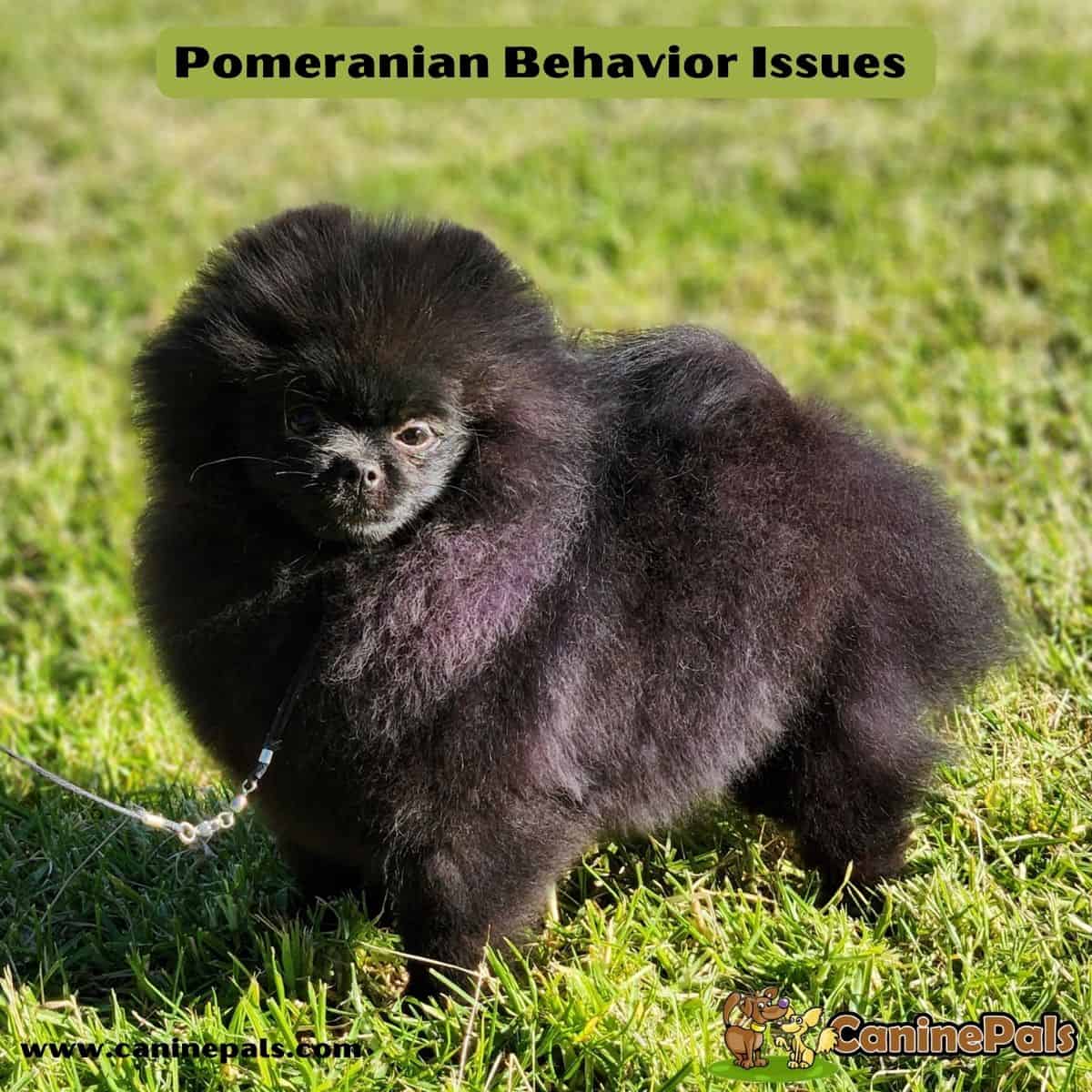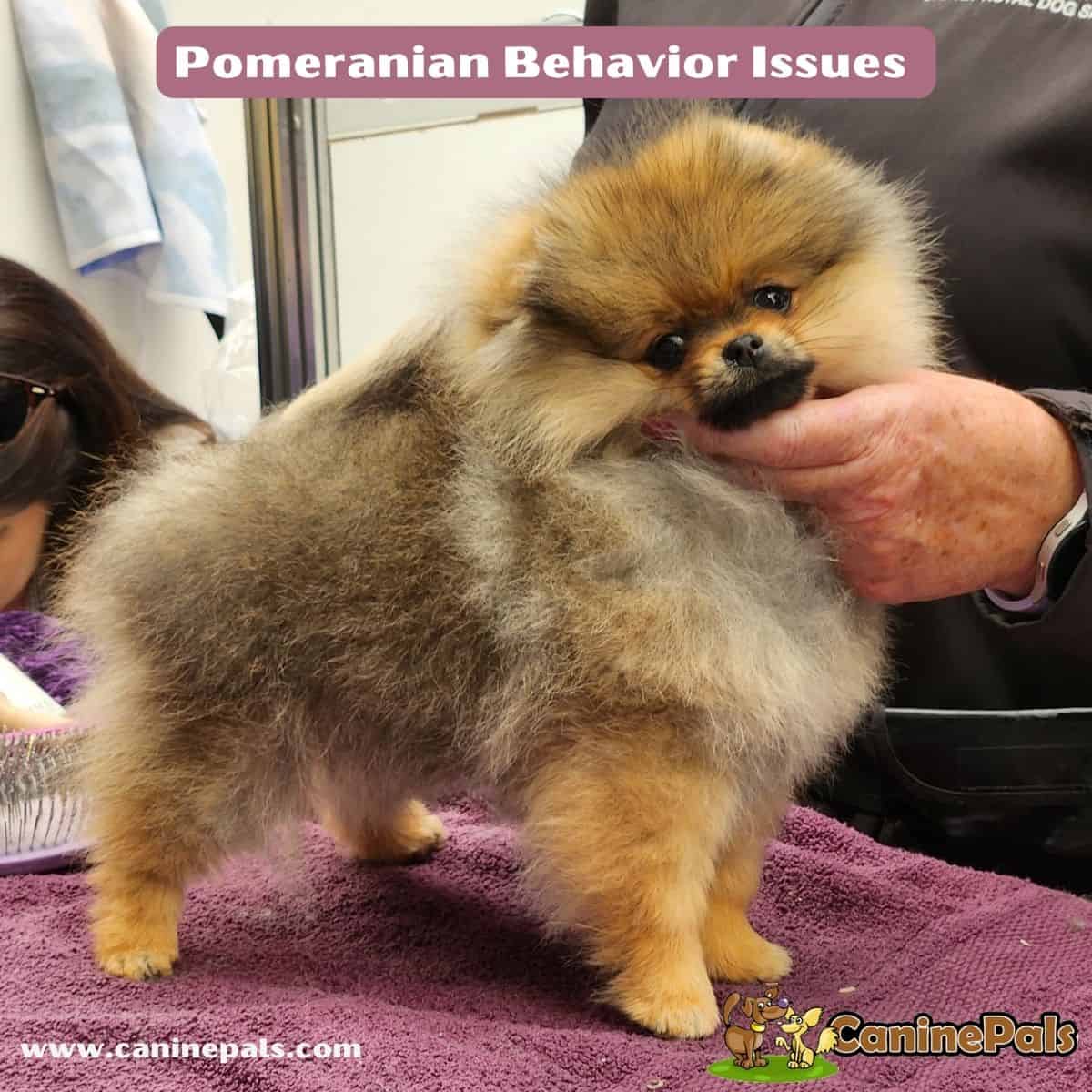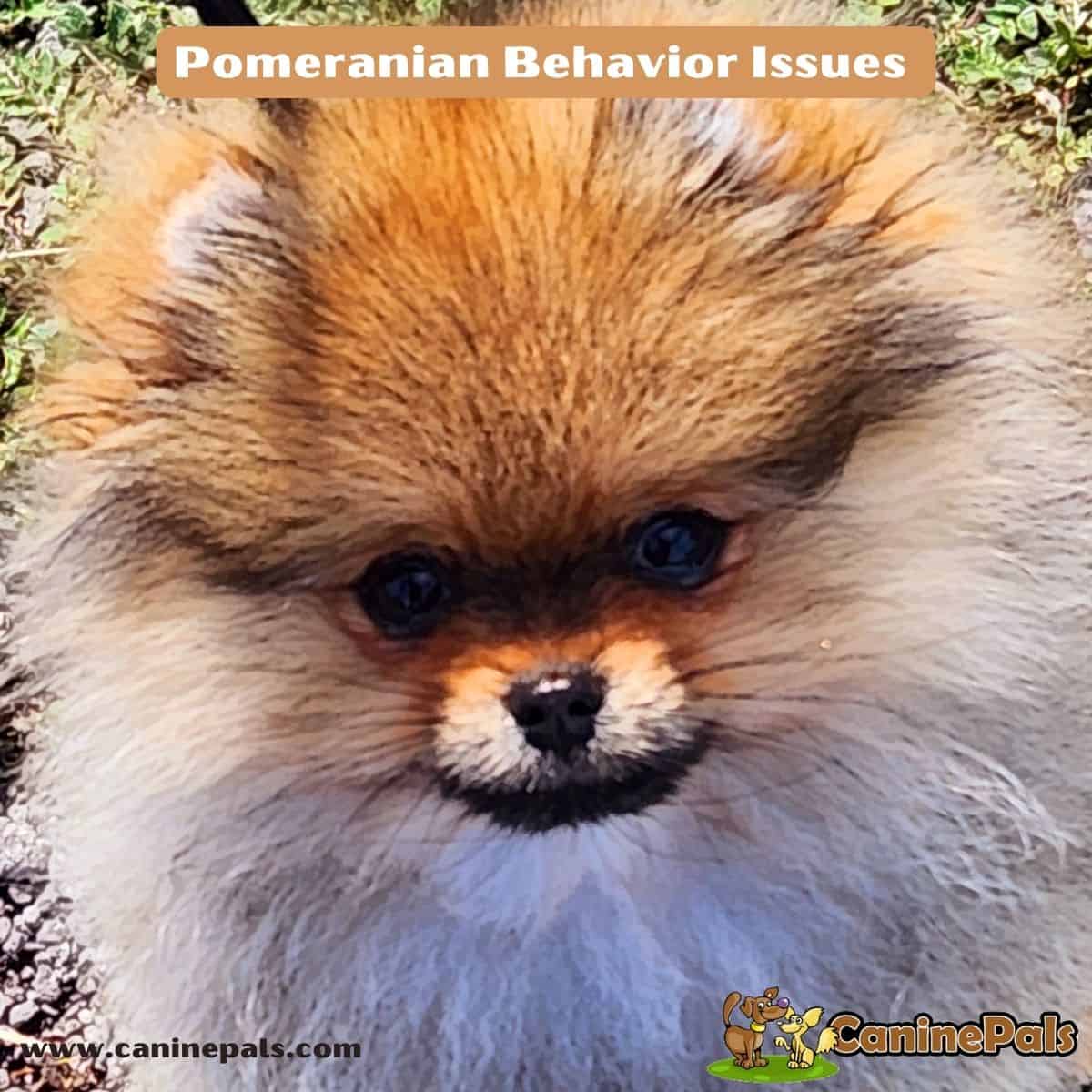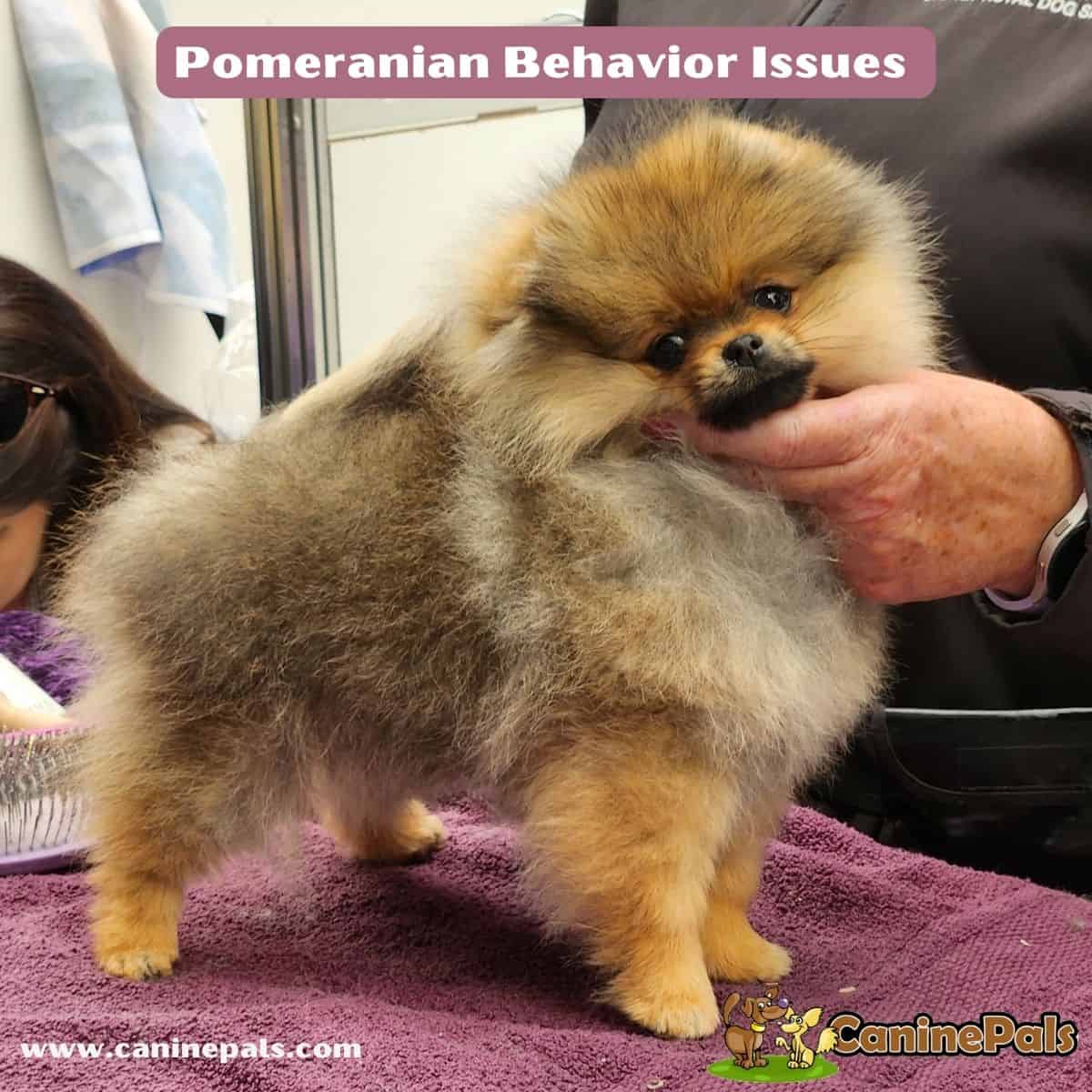Last Updated on March 19, 2024 by Denise Leo. Post first published on May 16, 2023.
Pomeranians are known for their small size and adorable appearance but also have unique behavior traits that make them stand out as a dog breed. Understanding Pomeranian behavior is vital for pet owners to provide proper care and training for their furry friends.
In this article, I will explore the behavior of Pomeranians based on insights from experts in the field. Discover how to understand and tackle common behavioral issues with your Pomeranian. Get the tips you need for a happy, healthy pup from the experts at Canine Pals.
Pomeranian Behavior Explained
Pomeranians are generally friendly, outgoing, and playful. They are known to be lively and energetic and love to be the center of attention. Pomeranians are also intelligent dogs and can be trained to perform various tasks, such as agility training or obedience training. However, like all breeds, Pomeranians have unique behavior traits to consider when adopting one.

Pomeranian Behavior Traits
- Pomeranian Temperament: Pomeranian dogs have a bold, confident temperament that can make them fearless and protective. They are generally affectionate with their owners but may be wary of strangers. Pomeranians are known to be prone to separation anxiety, which can cause destructive behavior if left alone for long periods.
- Socialization: Socialization is essential to raising a Pomeranian, and they need to be exposed to different people, animals, and environments to prevent fear or aggression. Early socialization can help Pomeranians become well-adjusted, friendly dogs.
- Exercise: Pomeranians are active little dogs that require daily exercise to keep them healthy and happy. Short walks, playtime, and indoor games are great ways to keep them entertained and stimulated. However, they are also prone to weight gain, so monitoring their food intake and exercise levels is essential.
- Training: Pomeranians are intelligent dogs eager to please, making them relatively easy to train. Owners should use positive reinforcement techniques, such as treats and praise, to work well with Pomeranians. However, they can sometimes be stubborn, so consistent training is necessary.

Toy Breed Dog Stereotypes
Don’t let Pomeranian dog breed stereotypes fool you. Claims that all toy breed dogs are ‘snappy’ and ‘yappy’ are invalid. Remembering each dog has a unique personality and behavior is important.
Factors determining temperament include instincts, the breeder’s socialization techniques, and the owner’s environment. With proper introductions to the outside world, any Pomeranian can behave accordingly.
In addition, with proper care and training, the behavior of a Pomeranian can be very calm and friendly. Negative behaviors such as nipping, growling, barking, and biting often result from improper hierarchy and poor training. You can ensure a Pomeranian will not develop these behaviors with good training.
Common Pomeranian Behavioral Issues
Sleeping Issues
If you’re a Pom owner, you know these little dogs are generally energetic. However, sudden lethargy or weakness could indicate a health problem or a significant environmental change. It’s essential to watch for these signs in your furry friend.
On the other hand, healthy Pomeranians can have bursts of activity followed by much-needed naps. If you’re curious about your Pom’s sleeping habits or are considering bringing one into your home, check out the Pomeranian sleep patterns guide.
Teething and Chewing Issues
Dealing with a teething pup or an older Pomeranian’s chewing habit can be challenging. The intense itching and discomfort during teething leads to compulsive chewing. And chewing habits may develop in Poms of any age for different reasons.
Coprophagia: When Dogs Eat Poop
This behavior problem isn’t just gross to witness – it can also have negative health consequences for dogs. While many dogs eat their own feces, some may also consume the waste of other canines or even cats.
Separation Anxiety
Separation anxiety is a common challenge experienced by dogs, including toy dog breeds like the Pomeranian, bred to be lap dog companions. It refers to the difficulties puppies or dogs face when left alone, leading to feelings of isolation and loneliness.
Barking
Barking is a natural behavior for most dogs, but excessive barking can be frustrating for pet owners, especially if they own a Pomeranian dog breed that tends to bark more frequently. Although this breed is known for being overly stimulated by visitors and other dogs, some Pomeranians may bark for no apparent reason, causing stress and annoyance for their owners.
Eating Issues
Does your Pomeranian have a picky eating habit? Here are some possible scenarios: rapid eating, hiding food, refusing kibble, being selective with only eating chicken, requiring hand-feeding, and demanding your presence during mealtime.
Begging For Food
If you own a Pomeranian, you may have noticed that they tend to beg for food. However, the most effective way to curb this behavior is by giving them treats only during scheduled meal times and avoiding rewarding them with food or attention when they beg. Following this simple strategy, you can train your Pomeranian to be well-behaved and avoid overfeeding them.
Guarding Food
If you’re a pet owner, food guarding can be a concern you should address. But don’t worry, there are some simple steps you can take to avoid any problems.
- Start by giving smaller food portions and incorporating treats into their meals.
- Try feeding them one piece of kibble at a time to increase engagement and prevent food aggression.
- And remember, only remove the food bowl if you’re offering something better in return.
These easy tips will ensure your pet’s safety and promote healthy eating habits.
Headstrong Behavior
Pomeranian dogs are known for being stubborn and assertive. They can be territorial and uneasy around strangers and other dogs despite their small size. Particularly if not appropriately socialized as puppies. Small children may unintentionally hurt or provoke them, leading to snapping or biting. Therefore, monitoring interactions between young kids and small Pomeranians is crucial. Many Pomeranian owners report that early obedience training benefits these dogs.
House Training
Owners of small dogs, like the Pomeranian, will need to put in more effort to potty train them. Small dogs have small bladders and must go more frequently than larger dogs. However, don’t worry! With consistent effort and vigilance, you can successfully house-train your pup.
Here are some tips:
- Take your dog outside to their designated potty area every one to two hours, especially in the morning, after meals, and before bed.
- If your pup is still young and has little control, take them out right after they wake up and after meals.
- Keep an eye out for signs your Pomeranian needs to go potty and try to prevent accidents.
When your puppy quickly takes care of business outside, make sure to give them lots of praise and a reward before returning indoors. Over time, your pup will understand that going out is for potty breaks. With patience and dedication, you and your furry friend will soon be potty-training pros.
Shyness
Although Pomeranians can experience shyness, teaching them to be confident is still possible. It’s important to show your dog there’s no need to be afraid. Here are some helpful tips to get started:
- Don’t give attention to your dog’s fear or comfort them when they’re timid.
- Celebrate and praise your pup when they show courage and learn something new.
- To ensure your Pomeranian is adaptable and comfortable in different environments, socialize with various people and animals.
- By socializing with your dog, you can help them overcome their shyness and build confidence.
Pomeranian Behavior Summary
| Behavior Trait | Description |
|---|---|
| Temperament | Confident, bold, affectionate with owners, wary of strangers, prone to separation anxiety |
| Socialization | Important to prevent fear or aggression toward people or animals |
| Exercise | Active dogs that require daily exercise to prevent weight gain |
| Training | Intelligent and eager to please, respond well to positive reinforcement techniques |
Pomeranian Behavior Advice from Breed Experts
Denise Leo from Dochlaggie Pomeranians says, “Pomeranians are outgoing, friendly dogs that make great companions. Poms are very intelligent and eager to please, making them easy to train.”
The American Kennel Club states that “Pomeranians are active dogs that require regular exercise to prevent obesity and to keep them mentally stimulated. Short walks, indoor games, and playtime are great ways to entertain them.”

Pomeranian Behavior Issues Conclusion:
In conclusion, Pomeranians are friendly, outgoing dogs with unique behavior traits that make them an excellent choice for a pet. Understanding their temperament, socialization needs, exercise requirements, and training methods is essential for providing proper care and training. With regular exercise, socialization, and training, Pomeranians can be well-adjusted, happy pets that bring joy to their owners’ lives.
Copyright CaninePals.Com. All Rights Reserved.
References and Further Reading:
- Official Standard of the Pomeranian (AKC). American Kennel Club, 2011.
- Official English Kennel Club Pomeranian Breed Standard, 2017.
- Kimbering Pomeranians “1891-1991”.
- Denise Leo, The Pomeranian Handbook.
- L.Ives, Show Pomeranians.
- L.Ziegler Spirer & H.F. Spirer, This is the Pomeranian.
- FEDERATION CYNOLOGIQUE INTERNATIONALE (FCI) German Spitz, including Keeshond and Pomeranian Breed Standards. PDF file.


